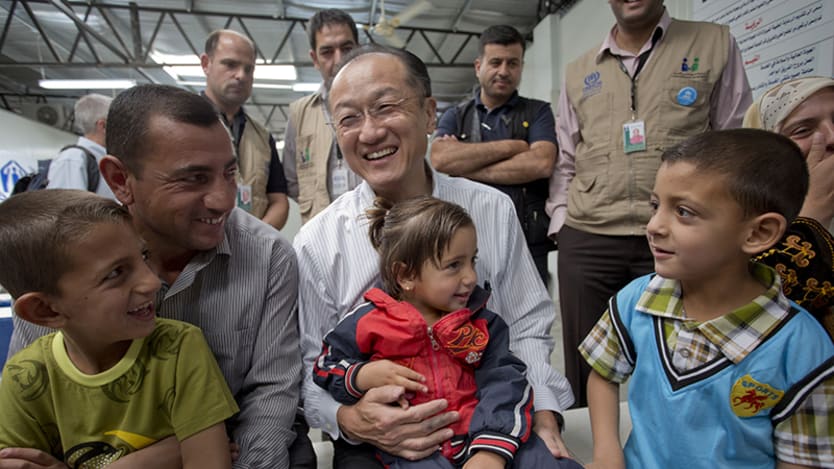
This week, three of the largest donors, namely the World Bank, the U.S. Agency for International Development and the European Investment Bank released key strategic documents and announced newly approved projects with significant funding implications.
The World Bank just released its country partnership frameworks for Jordan and Lebanon, covering fiscal years 2017-2022, with indicative programs amounting to $1.35 billion and $1.15 billion respectively. Both country strategies are designed to address the worsening regional conditions brought about by the Syrian conflict and are expected to provide immediate as well as medium- to long-term recovery assistance to the affected communities.
World Bank in Jordan and Lebanon
In Jordan, focus will be given toward fostering inclusive growth and job creation. The tentative pipeline of activities for Jordan for the first two years of the CPF implementation includes the following projects:
• Economic Opportunities for Jordanians and Syrian Refugees Program-for-Results ($300 million) FY2017
• Scale up Emergency Services and Social Resilience Project ($50 million) FY2017
• Second Energy and Water Development Policy Loan ($250 million) FY2017
• Red Sea-Dead Sea Partial Risk Guarantee ($100 million) FY2018
• Innovative Start-Ups and Micro, Small, and Medium Enterprises ($50 million) FY2018-2019
• Lagging Regions Operation ($200 million) FY2018-2019
• Social Contract Development Policy Loan ($250 million) FY2018
For Lebanon, the main objectives of its CPF are to strengthen service delivery for its expanded population and to increase human capital and economic opportunities. The initial projects listed in the indicative program for Lebanon are:
• Lake Qaraoun Pollution Prevention ($55 million) FY2017
• Land Administration System Modernization ($50 million) FY2018
• Greater Beirut Urban Transport ($200 million) FY2018-2019
• Infrastructure Investment for Sustainable Jobs ($120 million) FY 2018-2019
• Rural Roads and Employment Program ($200 million) FY2017-2018
• Scale up of Emergency Primary Healthcare Restoration Project ($60 million) FY2018-2019
• Municipal Service Delivery, Local Economic Development, and Social Cohesion ($150 million) FY2017-2018
• Reaching All Children with Education in Lebanon Support Program-for-Results ($235 million) FY2017
• Subsidized Temporary Employment Program ($20 million) FY2018-2019
• Additional Financing to National Poverty Targeting Program ($20 million) FY2017-2018
• Leveraging Innovation in Financial Service Provision to Manage Crisis in Lebanon ($3.2 million) FY2017
USAID
Meanwhile, USAID published its latest quarterly business forecast covering the last quarter of 2016. The USAID Mission Competitive Forecast lists information from 59 USAID missions including key details on 196 programs. In this latest version, the countries with the most programs listed are Afghanistan, totalling 11 programs, followed by Guatemala and South Africa with nine programs each. Bangladesh, meanwhile, has eight programs listed, while Cambodia and Ethiopia have seven forecasted programs each.
In comparison to the previous USAID business forecast, no additions were made under the new programs. However, the High Value Agriculture Activity contract in Moldova, forecasted for March, has officially been cancelled.
Another strategic document, the USAID Washington Competitive Forecast, lists 22 business opportunities, of which eight had just been added. These programs include:
• All Children Reading — Asia Task Order (ACR-Asia TO), Bureau for Asia, Task Order/Delivery Order. ($10 million-$24.99 million)
• Developing Regional Energy Markets, Bureau for Europe and Eurasia, Task Order/Delivery Order, ($10 million-$24.99 million)
• Cuba — Financial Compliance Services, Bureau for Latin America and the Caribbean, Contract, ($500,000-$999,999)
• Cuba — Monitoring and Evaluation Services, Bureau for Latin America and the Caribbean, Contract, ($500,000 - $999,999)
• LAC Youth Violence Prevention Task Order, Bureau for Latin America and the Caribbean ($4 million-$9.99 million)
• LEAP III (Learning, Evaluation and Analysis Project), Office of Economic Policy, Contract, ($10 million-$24.99 million)
• Emergency Notification System, Office of Management Services, GSA Task/Delivery Order ($500,000-$999,999)
• Promoting Excellence in Private Sector Engagement (PEPSE), U.S. Global Development Lab, Blanket Purchase Agreement ($25 million-$49.99 million)
The biggest opportunity on Washington forecast is for the next phase of the Famine Early Warning System Network, or FEWS NET. It is an indefinite delivery, indefinite quantity contract with an indicative budget ranging from $1 billion to $1.49 billion. Previously, this IDIQ was forecasted to be released in August, but has since been moved to September 1, 2016. It is being prepared by the Bureau for Democracy and Conflict and Humanitarian Assistance.
USAID will be hosting a Business Forecast review conference call on Aug. 4 from 9:30-10:00 a.m. EDT. Inquiries will be accepted until July 25 via m.oaa.comms@usaid.gov.
EIB
Finally, the board of directors at EIB just approved 9.4 billion euros ($10.3 billion) worth of new financing for 56 projects across Europe and around the world. Over 750 million euros will be invested in the following eight projects outside Europe:
• Adenia Capital IV Fund: Closed-end private equity investment fund targeting SMEs in sub-Saharan Africa (20 million euros)
• Kenya Power Distribution Last Mile Connectivity: Implementation of electrification schemes targeting the connection of customers to the distribution network, primarily in rural areas (60 million euros)
• Olkaria I Geothermal Extension Project in Kenya (72 million euros)
• Neoenergia Electricity Distribution II Project in Brazil: For financing the modernization and expansion program of the electricity distribution network of COELBA, Neoenergia’s distribution subsidiary in the State of Bahia (200 million euros)
• Bahia State Road Rehabilitation and Safety Project in Brazil: Rehabilitation of over 3,500 km of state highways in the State of Bahia and improvement of road safety, also in some of the secondary and municipal roads, by eliminating about 900 critical spots. (176 million euros)
• DEPOLMED Project in Tunisia: Rehabilitation and extension of waste water treatment plants along with sewerage network located in coastal areas. (70 million euros)
• STEG V Transport Electricity Project in Tunisia: Investment programme encompassing several electricity transmission schemes geographically distributed over the territory of Tunisia with circa 60 percent of the investments located in the area of Tunis (55 million euros)
• Banque de Tunisie — Loan for SMEs: For financing projects undertaken by private and public, industrial and commercial, SMEs and very small enterprises acting in all sectors of the Tunisian economy. (100 million euros)
Check out more practical business and development advice online, and subscribe to Money Matters to receive the latest contract award and shortlist announcements, and procurement and fundraising news.
